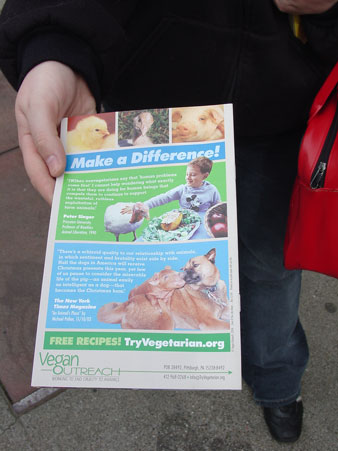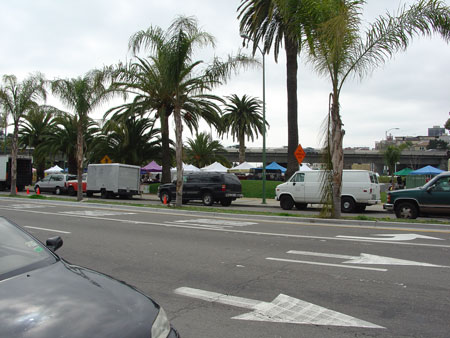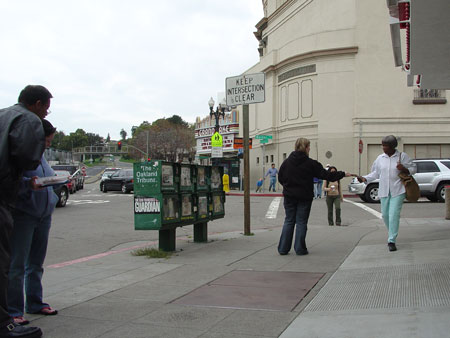From the Open-Publishing Calendar
From the Open-Publishing Newswire
Indybay Feature
East Bay Animal Advocates' Veggie Feed-In in Oakland 2/26: photos
East Bay Animal Advocates sponsored a vegetarian feed-in at the KFC at 470 Lake Park Avenue, right by the Grand Lake Theater in Oakland. Outside the fast food restaurant, volunteers served vegetarian 'turkey' to passers-by and distributed pamphlets with information on the inhumane treatment of factory-farmed animals.

East Bay Animal Advocates are an all-volunteer grassroots animal advocacy organization focused on farmed animal issues and hold frequent events throughout the East Bay. They document conditions on factory farms and periodically rescue abused farm animals. Besides their main website, see also: http://www.free-range-turkey.com, http://www.turkeystory.com, and http://www.indybay.org/archives/archive_by_id.php?id=2670&category_id=58.
For more information:
http://www.eastbayanimaladvocates.org
Add Your Comments
Comments
(Hide Comments)
Good job. I think the combination of nice people, sane yummy alternatives, and info on what the corporation is doing are all good things that help the larger population steer in a new direction.
Right on girls, great work ...wish I could have joined you. :-)
Typical response. their are million yummy BBQ fake-wing-type foods out there. AND THE ANIMAL WONT BE KILLED YOU IDIOT!
What's wrong with killing animals?
Why should we listen to people that call us idiots?
Why should we listen to people that call us idiots?
New research opens a window on the minds of plants
By Patrik Jonsson | Correspondent of The Christian Science Monitor
RALEIGH, N.C. – Hardly articulate, the tiny strangleweed, a pale parasitic plant, can sense the presence of friends, foes, and food, and make adroit decisions on how to approach them.
Mustard weed, a common plant with a six-week life cycle, can't find its way in the world if its root-tip statolith - a starchy "brain" that communicates with the rest of the plant - is cut off.
The ground-hugging mayapple plans its growth two years into the future, based on computations of weather patterns. And many who visit the redwoods of the Northwest come away awed by the trees' survival for millenniums - a journey that, for some trees, precedes the Parthenon.
As trowel-wielding scientists dig up a trove of new findings, even those skeptical of the evolving paradigm of "plant intelligence" acknowledge that, down to the simplest magnolia or fern, flora have the smarts of the forest. Some scientists say they carefully consider their environment, speculate on the future, conquer territory and enemies, and are often capable of forethought - revelations that could affect everyone from gardeners to philosophers.
Indeed, extraordinary new findings on how plants investigate and respond to their environments are part of a sprouting debate over the nature of intelligence itself.
"The attitude of people is changing quite substantially," says Anthony Trewavas, a plant
biochemist at the University of Edinburgh in Scotland and a prominent scholar of plant intelligence. "The idea of intelligence is going from the very narrow view that it's just human to something that's much more generally found in life."
To be sure, there are no signs of Socratic logic or Shakespearean thought, and the subject of plant "brains" has sparked heated exchanges at botany conferences. Plants, skeptics scoff, surely don't fall in love, bake soufflés, or ponder poetry. And can a simple reaction to one's environment truly qualify as active, intentional reasoning?
But the late Nobel Prize-winning plant geneticist Barbara McClintock called plant cells "thoughtful." Darwin wrote about root-tip "brains." Not only can plants communicate with each other and with insects by coded gas exhalations, scientists say now, they can perform Euclidean geometry calculations through cellular computations and, like a peeved boss, remember the tiniest transgression for months.
To a growing number of biologists, the fact that plants are now known to challenge and exert power over other species is proof of a basic intellect.
"If intelligence is the capacity to acquire and apply knowledge, then, absolutely, plants are intelligent," agrees Leslie Sieburth, a biologist at the University of Utah in Salt Lake City.
For philosophers, one of the key findings is that two cuttings, or clones, taken from the same "mother plant" behave differently even when planted in identical conditions.
"We now know there's an ability of self-recognition in plants, which is highly unusual and quite extraordinary that it's actually there," says Dr. Trewavas. "But why has no one come to grips with it? Because the prevailing view of a plant, even among plant biologists, is that it's a simple organism that grows reproducibly in a flower pot."
But here at the labs on the North Carolina State campus, where fluorescent grow-rooms hold genetic secrets and laser microscopes parse the inner workings of live plants, there is still skepticism about the ability of ordinary houseplants to intellectualize their environment.
Most plant biologists are still looking at the mysteries of "signal transduction," or how genetic, chemical, and hormonal orders are dispersed for complex plant behavior. But skeptics say it's less a product of intelligence than mechanical directives, more genetic than genius. Some see the attribution of intelligence to plants as relative - an oversimplification of a complex human trait.
And despite intensifying research, exactly how a plant's complex orders are formulated and carried out remains draped in leafy mystery.
"There is still much that we do not know about how plants work, but a big part of intelligence is self-consciousness, and plants do not have that," says Heike Winter Sederoff, a plant biologist at N.C. State.
Still, a new NASA grant awarded to the university to study gravitational effects on crop plants came in part due to new findings that plants have neurotransmitters very similar to humans' - capable, perhaps, of offering clues on how gravity affects more sentient beings. The National Science Foundation has awarded a $5 million research grant to pinpoint the molecular clockwork by which plants know when to grow and when to flower.
The new field of plant neurobiology holds its first conference - The First Symposium on Plant Neurobiology - in May in Florence, Italy.
The debate is rapidly moving past the theoretical. In space, "smart plants" can provide not only food, oxygen, and clean air, but also valuable companionship for lonely space travelers, say some - a boon for astronauts if America is to go to Mars. Research on the workings of the mustard weed's statolith, for example, may one day yield a corn crop with 1-3/8 the gravitational force of Earth.
Some Earth-bound farmers, meanwhile, see the possibility of communicating with plants to time waterings for ultimate growth. A new gene, Bypass-1, found by University of Utah researchers, may make that possible.
Still, it can be hard for the common houseplant to command respect - even among those who study it most closely.
"When I was a postdoc, I had a neighbor who watched me buy plants, forget to water them, and throw them out, buy them and throw them out," says Dr. Sieburth. "When she found out I had a PhD in botany, I thought she was going to die."
http://www.csmonitor.com/2005/0303/p01s03-usgn.html
By Patrik Jonsson | Correspondent of The Christian Science Monitor
RALEIGH, N.C. – Hardly articulate, the tiny strangleweed, a pale parasitic plant, can sense the presence of friends, foes, and food, and make adroit decisions on how to approach them.
Mustard weed, a common plant with a six-week life cycle, can't find its way in the world if its root-tip statolith - a starchy "brain" that communicates with the rest of the plant - is cut off.
The ground-hugging mayapple plans its growth two years into the future, based on computations of weather patterns. And many who visit the redwoods of the Northwest come away awed by the trees' survival for millenniums - a journey that, for some trees, precedes the Parthenon.
As trowel-wielding scientists dig up a trove of new findings, even those skeptical of the evolving paradigm of "plant intelligence" acknowledge that, down to the simplest magnolia or fern, flora have the smarts of the forest. Some scientists say they carefully consider their environment, speculate on the future, conquer territory and enemies, and are often capable of forethought - revelations that could affect everyone from gardeners to philosophers.
Indeed, extraordinary new findings on how plants investigate and respond to their environments are part of a sprouting debate over the nature of intelligence itself.
"The attitude of people is changing quite substantially," says Anthony Trewavas, a plant
biochemist at the University of Edinburgh in Scotland and a prominent scholar of plant intelligence. "The idea of intelligence is going from the very narrow view that it's just human to something that's much more generally found in life."
To be sure, there are no signs of Socratic logic or Shakespearean thought, and the subject of plant "brains" has sparked heated exchanges at botany conferences. Plants, skeptics scoff, surely don't fall in love, bake soufflés, or ponder poetry. And can a simple reaction to one's environment truly qualify as active, intentional reasoning?
But the late Nobel Prize-winning plant geneticist Barbara McClintock called plant cells "thoughtful." Darwin wrote about root-tip "brains." Not only can plants communicate with each other and with insects by coded gas exhalations, scientists say now, they can perform Euclidean geometry calculations through cellular computations and, like a peeved boss, remember the tiniest transgression for months.
To a growing number of biologists, the fact that plants are now known to challenge and exert power over other species is proof of a basic intellect.
"If intelligence is the capacity to acquire and apply knowledge, then, absolutely, plants are intelligent," agrees Leslie Sieburth, a biologist at the University of Utah in Salt Lake City.
For philosophers, one of the key findings is that two cuttings, or clones, taken from the same "mother plant" behave differently even when planted in identical conditions.
"We now know there's an ability of self-recognition in plants, which is highly unusual and quite extraordinary that it's actually there," says Dr. Trewavas. "But why has no one come to grips with it? Because the prevailing view of a plant, even among plant biologists, is that it's a simple organism that grows reproducibly in a flower pot."
But here at the labs on the North Carolina State campus, where fluorescent grow-rooms hold genetic secrets and laser microscopes parse the inner workings of live plants, there is still skepticism about the ability of ordinary houseplants to intellectualize their environment.
Most plant biologists are still looking at the mysteries of "signal transduction," or how genetic, chemical, and hormonal orders are dispersed for complex plant behavior. But skeptics say it's less a product of intelligence than mechanical directives, more genetic than genius. Some see the attribution of intelligence to plants as relative - an oversimplification of a complex human trait.
And despite intensifying research, exactly how a plant's complex orders are formulated and carried out remains draped in leafy mystery.
"There is still much that we do not know about how plants work, but a big part of intelligence is self-consciousness, and plants do not have that," says Heike Winter Sederoff, a plant biologist at N.C. State.
Still, a new NASA grant awarded to the university to study gravitational effects on crop plants came in part due to new findings that plants have neurotransmitters very similar to humans' - capable, perhaps, of offering clues on how gravity affects more sentient beings. The National Science Foundation has awarded a $5 million research grant to pinpoint the molecular clockwork by which plants know when to grow and when to flower.
The new field of plant neurobiology holds its first conference - The First Symposium on Plant Neurobiology - in May in Florence, Italy.
The debate is rapidly moving past the theoretical. In space, "smart plants" can provide not only food, oxygen, and clean air, but also valuable companionship for lonely space travelers, say some - a boon for astronauts if America is to go to Mars. Research on the workings of the mustard weed's statolith, for example, may one day yield a corn crop with 1-3/8 the gravitational force of Earth.
Some Earth-bound farmers, meanwhile, see the possibility of communicating with plants to time waterings for ultimate growth. A new gene, Bypass-1, found by University of Utah researchers, may make that possible.
Still, it can be hard for the common houseplant to command respect - even among those who study it most closely.
"When I was a postdoc, I had a neighbor who watched me buy plants, forget to water them, and throw them out, buy them and throw them out," says Dr. Sieburth. "When she found out I had a PhD in botany, I thought she was going to die."
http://www.csmonitor.com/2005/0303/p01s03-usgn.html
Good for you courageous souls. In response to "What's wrong with killing animals", the main issue is the inhumanity of the animals' treatment while they are alive. Look at pictures of cows lying in their excrement in feed lots, chickens crammed into windowless chicken houses after their beaks have been cut off so they won't peck eachother to death, for example, then make a consious decision about whether you would like to support this behavior by continuing to eat meat.
One does not support inhumanely raised meat by eating meat. One supports inhumanely raised meat by eating inhumanely raised meat, but only if it's paid for. Eating humanely raised meat does not support the raising of meat inhumanely. Neither does eating expropriated meat.
Another advantage to eating humanely raised meat is that it is better for your health, also for the health of the environment. Organic, free range meat, eaten in moderation, is good for you. Feed lot meat is polluted. It’s production pollutes the environment. Don't buy it.
Another advantage to eating humanely raised meat is that it is better for your health, also for the health of the environment. Organic, free range meat, eaten in moderation, is good for you. Feed lot meat is polluted. It’s production pollutes the environment. Don't buy it.
The terms 'free range' and 'organic' are really just marketing tools that are becoming almost meaningless.
While many of us may think of “free-range” farms as idyllic places where pigs relax in mud baths, chickens strut about, and cows graze leisurely in lush, green pastures while their calves romp playfully, most are nothing like that. There are few government regulations or industry standards to monitor the use of the term “free range,” so inhumane conditions and mistreatment of the animals are common. In fact, the U.S. Department of Agriculture defines “free-range” and “free-roaming” only for labeling purposes and has no inspection system in place to verify that those farms claiming to be “free-range” actually are.
As with factory-farmed animals, “free-range” animals can be subjected to the same physical mutilations without painkillers and are still sent to the same slaughterhouses as their factory-farmed relatives at a young age when their “productivity” wanes. So while you may delude yourself that you are not participating in the cycle of cruelty, it is just not true.
"You have just dined, and however scrupulously the slaughterhouse is concealed in the graceful distance of miles, there is complicity." ~Ralph Waldo Emerson
While many of us may think of “free-range” farms as idyllic places where pigs relax in mud baths, chickens strut about, and cows graze leisurely in lush, green pastures while their calves romp playfully, most are nothing like that. There are few government regulations or industry standards to monitor the use of the term “free range,” so inhumane conditions and mistreatment of the animals are common. In fact, the U.S. Department of Agriculture defines “free-range” and “free-roaming” only for labeling purposes and has no inspection system in place to verify that those farms claiming to be “free-range” actually are.
As with factory-farmed animals, “free-range” animals can be subjected to the same physical mutilations without painkillers and are still sent to the same slaughterhouses as their factory-farmed relatives at a young age when their “productivity” wanes. So while you may delude yourself that you are not participating in the cycle of cruelty, it is just not true.
"You have just dined, and however scrupulously the slaughterhouse is concealed in the graceful distance of miles, there is complicity." ~Ralph Waldo Emerson
Have we fewer rights than pigs or bears?
You have the ability to choose life over death. A few more quotes to think about:
"A man can live and be healthy without killing animals for food; therefore, if he eats meat, he participates in taking animal life merely for the sake of his appetite." ~Leo Tolstoy
"Truely man is the king of beasts, for his brutality exceeds theirs. We live by the death of others: we are burial places! I have from an early age abjured the use of meat, and the time will come when men such as I will look on the murder of animals as they now look on the murder of men." ~Leonardo da Vinci
"I have no doubt that it is a part of the destiny of the human race, in its gradual improvement, to leave off eating animals, as surely as the savage tribes have left off eating each other." ~Henry David Thoreau, Walden, 1854
"People often say that humans have always eaten animals, as if this is a justification for continuing the practice. According to this logic, we should not try to prevent people from murdering other people, since this has also been done since the earliest of times." ~Isaac Bashevis Singer
"While we ourselves are the living graves of murdered beasts, how can we expect any ideal conditions on this earth?" ~George Bernard Shaw
"To my mind, the life of a lamb is no less precious than that of a human being. I should be unwilling to take the life of a lamb for the sake of the human body." ~Mahatma Gandhi
"A man can live and be healthy without killing animals for food; therefore, if he eats meat, he participates in taking animal life merely for the sake of his appetite." ~Leo Tolstoy
"Truely man is the king of beasts, for his brutality exceeds theirs. We live by the death of others: we are burial places! I have from an early age abjured the use of meat, and the time will come when men such as I will look on the murder of animals as they now look on the murder of men." ~Leonardo da Vinci
"I have no doubt that it is a part of the destiny of the human race, in its gradual improvement, to leave off eating animals, as surely as the savage tribes have left off eating each other." ~Henry David Thoreau, Walden, 1854
"People often say that humans have always eaten animals, as if this is a justification for continuing the practice. According to this logic, we should not try to prevent people from murdering other people, since this has also been done since the earliest of times." ~Isaac Bashevis Singer
"While we ourselves are the living graves of murdered beasts, how can we expect any ideal conditions on this earth?" ~George Bernard Shaw
"To my mind, the life of a lamb is no less precious than that of a human being. I should be unwilling to take the life of a lamb for the sake of the human body." ~Mahatma Gandhi
We are 100% volunteer and depend on your participation to sustain our efforts!
Get Involved
If you'd like to help with maintaining or developing the website, contact us.
Publish
Publish your stories and upcoming events on Indybay.
Topics
More
Search Indybay's Archives
Advanced Search
►
▼
IMC Network











